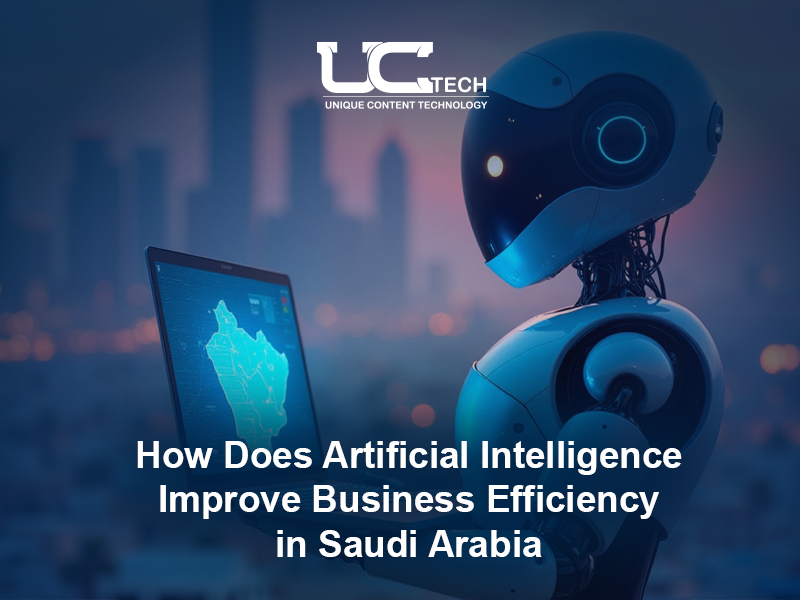In today’s rapidly evolving digital economy, Artificial Intelligence (AI) is no longer a futuristic concept; it’s a practical and powerful tool that’s transforming how Saudi enterprises operate, innovate, and compete.
What if your business could work smarter, not harder and do so at scale?
From small and medium-sized enterprises (SMEs) to large public-sector institutions, AI is becoming the catalyst for boosting business efficiency with smart tech across the Kingdom and the wider Gulf region.
As Saudi Arabia continues its ambitious Vision 2030 goals, many organizations are turning to AI solutions for businesses to stay ahead in a competitive marketplace. But how exactly does AI drive business efficiency, and why should decision-makers care now more than ever?
What Is Business Efficiency and How Does AI Influence It?
Business efficiency refers to how effectively a company uses its resources—time, capital, labor, and data to deliver value. When operations are optimized, costs decrease, productivity rises, and customer satisfaction improves.
Using AI for business process optimization allows companies to achieve these goals with unprecedented speed and accuracy.
AI enhances business efficiency by automating routine tasks, generating real-time insights, and enabling smarter decision-making. This is especially critical in today’s data-rich environment, where manually processing information is not just slow, it’s costly.
With access to enterprise AI transformation strategy tools and modern knowledge management systems, organizations can focus more on strategic growth and less on administrative bottlenecks.
How AI Reduces Operational Costs and Boosts Productivity
One of the most immediate benefits of AI in business is cost reduction. AI tools can perform repetitive tasks faster, with fewer errors, and at a lower cost than human labor. From robotic process automation (RPA) to intelligent virtual assistants, smart systems are enabling smart automation in Saudi enterprises across sectors such as banking, healthcare, logistics, and retail.
For instance, AI services for businesses in Saudi Arabia have helped automate invoice processing, employee onboarding, and customer service workflows. These AI applications in business operations not only save time but also improve employee productivity by freeing up human resources for more value-driven tasks.
Moreover, predictive analytics for business decisions helps companies forecast demand, reduce waste, and optimize supply chains, all contributing to AI tools to reduce operational costs.
Real-World Examples of AI Applications in the Saudi Market
AI is already creating tangible results across the Kingdom:
- Healthcare: Leading medical institutions are using advanced business intelligence tools and AI-based diagnostics to analyze patient data, reducing diagnostic time and enhancing treatment outcomes.
- Retail & E-commerce: AI-powered recommendation engines and chatbots have revolutionized how consumers interact with brands online, driving conversions and enhancing customer experiences.
- Finance: Banks and fintech firms are employing AI consulting for enterprises to detect fraudulent transactions in real-time, evaluate credit risk, and personalize financial products.
- Public Sector: Government bodies are adopting digital transformation for companies through smart city initiatives, using AI to manage traffic flows, public safety, and citizen services.
These examples of AI in Saudi organizations underscore how deeply integrated AI has become in both public and private enterprises.
How AI Enables Faster and More Accurate Decision-Making
In the age of information, speed and accuracy are essential. With AI-based decision making for companies, leaders can move from gut-feeling to data-backed strategies. AI algorithms sift through massive volumes of enterprise data to uncover patterns and deliver actionable insights, allowing executives to respond proactively to market shifts or operational inefficiencies.
Enterprise data analytics services and top data analytics tools empower organizations to move beyond descriptive analytics (what happened) to predictive and prescriptive analytics (what will happen and what to do about it). This leads to better forecasting, smarter resource allocation, and faster innovation.
Common Challenges in Adopting AI and How to Overcome Them
While the benefits are clear, integrating AI into business processes comes with its own set of challenges:
-
- Lack of technical expertise: Many SMEs lack in-house AI talent. Solution: Partner with providers offering AI consulting for enterprises tailored to the Saudi market.
- Data silos: Fragmented data prevents efficient AI modeling. Solution: Implement enterprise data analytics services and centralized knowledge systems.
- Cultural resistance: Employees may fear AI will replace their jobs. Solution: Emphasize how AI improves employee productivity by automating low-value tasks, not eliminating roles.
- Cost of implementation: High upfront costs can deter adoption. Solution: Start small with pilot projects and leverage government incentives supporting digital transformation for companies.
By addressing these hurdles early on, organizations can accelerate their journey toward enterprise AI transformation strategy success.
Conclusion:
AI is no longer optional, it’s essential. Whether you’re looking to scale operations, improve decision-making, or stay competitive, AI solutions for businesses offer the tools to unlock new levels of efficiency and innovation.
At Unique Content for Information Technology, we help organizations across Saudi Arabia harness the full potential of AI and advanced business intelligence tools to drive their digital future. From tailored strategies to turnkey implementations, we’re your partner in transformation.
Ready to transform your business with AI?
Contact us today for a personalized consultation and begin your journey toward smart, efficient growth.
FAQ: AI in Business Environments
Q1: Can small businesses in Saudi Arabia benefit from AI?
Q2: What industries are most affected by AI in Saudi Arabia?
Q3: How long does it take to see ROI from AI?
Q4: Is AI safe and compliant with Saudi regulations?
Q5: What are the most common artificial intelligence applications in business operations?
In Saudi Arabia, many enterprises are leveraging AI to streamline internal workflows, reduce human error, and boost overall operational efficiency, especially in sectors like healthcare, finance, and retail.
Q6: How does AI-based decision making benefit companies in real-world scenarios?
For example, Saudi retail businesses use AI to anticipate customer demand and manage inventory accordingly, while financial institutions apply AI models to assess credit risks more accurately.
This leads to faster, more informed, and less biased decisions, ultimately driving better business outcomes and competitive advantage

